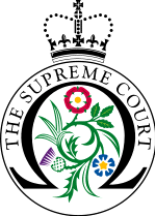
The Supreme Court of the United Kingdom (welsh: Llys Goruchaf y Deyrnas Unedig)
Date of establishment: 1st October 2009
Address and e-mail of the court:
The Supreme Court
Parliament Square
London
SW1P 3BD
Website :
https://www.supremecourt.uk/about/index.html (English version)
Link to the national database of their case law:
Decided cases: https://www.supremecourt.uk/decided-cases/index.html
Ongoing cases: https://www.supremecourt.uk/current-cases/index.html
The Supreme Court of the United Kingdom is the highest Court of Appeal for English & Welsh law, Northern Irish law and Scottish civil law (see attached PDF)
What does the court decide about:
The UK Supreme court is the highest appellate court in the United Kingdom, deciding on all matters of English & Welsh law, Northern Irish law and Scottish civil law (though not criminal). The court also has jurisdiction to resolve disputes regarding devolution in the UK, and the separation of powers between the UK’s 3 constituent legal entities (England & Wales, Northern Ireland and Scotland). It also has oversight in regards to the laws passed by the devolved legislatures in Wales, Northern Ireland and Scotland. It does not have the power to overturn primary legislature made by the Westminster Parliament however. It can make a Declaration of Incompatibility against both primary and secondary legislature, if it is breach of the European Convention on Human Rights, however this does not amount to an overturning of the law
The principals of procedure:
The Supreme Court can only receive an appeal if it has gained permission from a Court of Appeal, or from a Justice of the Supreme Court. Courts of Appeal include the English/Welsh courts for both criminal and civil cases, the Northern Irish court for criminal and civil cases, the High Courts in both jurisdictions in some cases, and the Court of Session in Scotland, only for civil cases. Devolution cases can reach the Supreme Court in three ways:
⦁ Through a reference from someone who can exercise relevant statutory powers such as the Attorney General, whether or not the issue is the subject of litigation
⦁ Through an appeal from certain higher courts in England and Wales, Scotland and Northern Ireland
⦁ Through a reference from certain appellate courts.
Usually only 5 judges sit on any given case, rather than the full number.
The number of justices and panels:
12 Justices
How are the justices appointed:
The Monarch technically. When vacancies arise, a committee is formed of the Supreme Court President, Deputy President and a member of the 3 Judicial Appointments Commissions of England/Wales, Northern Ireland and Scotland. These then recommend a candidate to the Lord Chancellor, who may or may not approve the candidate. If the Lord Chancellor does, he then informs the Prime Minister who then recommends the person’s appointment by the Monarch.